Swing music is a style of jazz that developed in the United States during the late 1920s and early 1930s. It became nationally popular from the mid-1930s. The name derived from its emphasis of the off-beat, or nominally weaker beat. Swing bands usually featured soloists who would improvise on the melody over the arrangement. The danceable swing style of big bands and bandleaders such as Benny Goodman was the dominant form of American popular music from 1935 to 1946, known as the swing era. The verb "to swing" is also used as a term of praise for playing that has a strong groove or drive. Musicians of the swing era include Duke Ellington, Benny Goodman, Count Basie, Cab Calloway, Jimmy Dorsey, Tommy Dorsey, Woody Herman, Harry James, Lionel Hampton, Glenn Miller, Artie Shaw and Django Reinhardt.

Thomas Francis Dorsey Jr. was an American jazz trombonist, composer, conductor and bandleader of the big band era. He was known as the "Sentimental Gentleman of Swing" because of his smooth-toned trombone playing. His theme song was "I'm Getting Sentimental Over You". His technical skill on the trombone gave him renown among other musicians. He was the younger brother of bandleader Jimmy Dorsey. After Dorsey broke with his brother in the mid-1930s, he led an extremely successful band from the late 1930s into the 1950s. He is best remembered for standards such as "Opus One", "Song of India", "Marie", "On Treasure Island", and his biggest hit single, "I'll Never Smile Again".
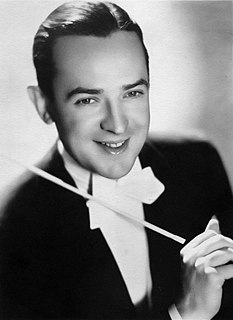
James Francis Dorsey was an American jazz clarinetist, saxophonist, composer and big band leader. He recorded and composed the jazz and pop standards "I'm Glad There Is You " and "It's The Dreamer In Me". His other major recordings were "Tailspin", "John Silver", "So Many Times", "Amapola", "Brazil ", "Pennies from Heaven" with Bing Crosby, Louis Armstrong, and Frances Langford, "Grand Central Getaway", and "So Rare". He played clarinet on the seminal jazz standards "Singin' the Blues" in 1927 and the original 1930 recording of "Georgia on My Mind", which were inducted into the Grammy Hall of Fame.
"Nice Work If You Can Get It" is a popular song and jazz standard composed by George Gershwin with lyrics by Ira Gershwin.
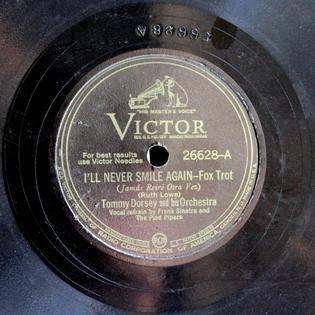
"I'll Never Smile Again" is a 1939 song written by Ruth Lowe. It has been recorded by many other artists since, becoming a standard.

"Fascinating Rhythm" is a popular song written by George Gershwin in 1924 with lyrics by Ira Gershwin.
"East of the Sun " is a popular song written by Brooks Bowman, an undergraduate member of Princeton University's Class of 1936, for the 1934 production of the Princeton Triangle Club's production of Stags at Bay. It was published in 1934 by Santly Bros. and soon became a hallmark of the Princeton Tigertones, one of Princeton University's all-male a cappella groups. The standard is also sung by the Princeton Nassoons, Princeton University's oldest a cappella group.
"Darn That Dream" is a popular song composed by Jimmy Van Heusen with lyrics by Eddie DeLange. It was published in 1939 and ranked No. 1 in 1940 when a recording was released by Benny Goodman in an arrangement by Eddie Sauter with Mildred Bailey singing the vocal. Other popular recordings in 1940 were by Blue Barron & His Orchestra and by Tommy Dorsey.

"I Don't Stand a Ghost of a Chance With You" is a 1932 song recorded by Bing Crosby with Orchestral Accompaniment. The music was composed by Victor Young, with lyrics written by Ned Washington and Bing Crosby. The song is a jazz and pop standard recorded by many different artists.
"Honeysuckle Rose" is a 1929 song composed by Fats Waller with lyrics by Andy Razaf. It was introduced in the 1929 Off-Broadway revue "Load of Coal" at Connie's Inn as a soft-shoe dance number. Waller's 1934 recording was inducted in the Grammy Hall of Fame in 1999.

"I'm Glad There Is You " is a song written by Jimmy Dorsey and Paul Madeira first published in 1941. It has become a jazz and pop standard.
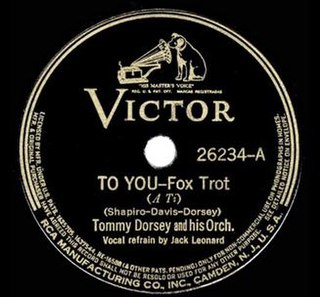
"To You" is a 1939 song composed by Tommy Dorsey with Benny Davis and Ted Shapiro. The song was a top 10 hit on the Billboard charts.

"This Is No Dream" is a 1939 song co-written by Tommy Dorsey with Benny Davis and Ted Shapiro and released as a 78 single by his orchestra.

"In The Middle Of A Dream" is a 1939 song composed by Tommy Dorsey, Einar Swan, and Al Stillman. The song became a Top Ten hit in 1939 when released by Tommy Dorsey and His Orchestra.
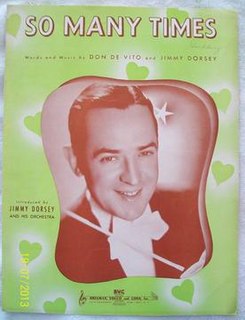
So Many Times is a 1939 song written by Jimmy Dorsey and Don De Vito. The song was released as a single in 1939 by Jimmy Dorsey and His Orchestra, becoming a Top 20 hit.
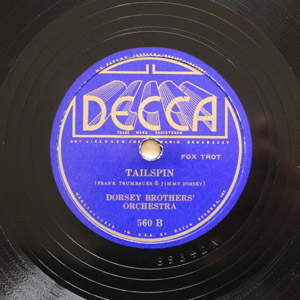
Tailspin is a 1934 song written by Jimmy Dorsey and Frankie Trumbauer. The song was released by Paul Whiteman and His Orchestra featuring Frankie Trumbauer in 1934 on Victor and by The Dorsey Brothers Orchestra in 1935 as a Decca single.

"The Morning After" is a 1937 song composed by Tommy Dorsey, Moe Jaffe, and Clay Boland. Tommy Dorsey and His Orchestra released the song as a Victor 78 single in 1937 with Jack Leonard on vocals.
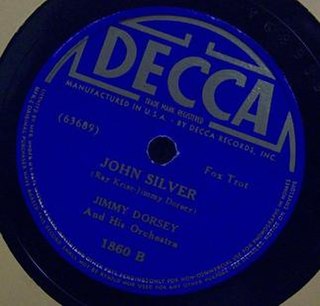
John Silver is a 1938 song written by Jimmy Dorsey with Ray Krise. Jimmy Dorsey and His Orchestra released the song as a 78 single on Decca in 1938.

"Singin' the Blues" is a 1920 jazz composition by J. Russel Robinson, Con Conrad, Sam M. Lewis, and Joe Young. It was recorded by the Original Dixieland Jass Band in 1920 as an instrumental and released as a Victor 78 as part of a medley with "Margie". The song was released with lyrics by vocalist Aileen Stanley in 1920 on Victor. In 1927, Frank Trumbauer, Bix Beiderbecke, and Eddie Lang recorded and released the song as an Okeh 78. The Trumbauer recording is considered a jazz and pop standard, greatly contributing to Frank Trumbauer and Bix Beiderbecke's reputation and influence. It is not related to the 1956 pop song "Singing the Blues" first recorded and released by Marty Robbins in 1956.
Joseph P. Lippman was an American composer, arranger, conductor, pianist, and songwriter working in jazz and traditional pop. His musical career was over five decades long, having started at age 19 with the Benny Goodman orchestra in 1934 and writing for television, films, and Broadway in the 1980s. He composed and arranged for Bunny Berigan, Jimmy Dorsey, Sarah Vaughan, Charlie Parker and worked as staff arranger in television for Perry Como and Hollywood Palace.














